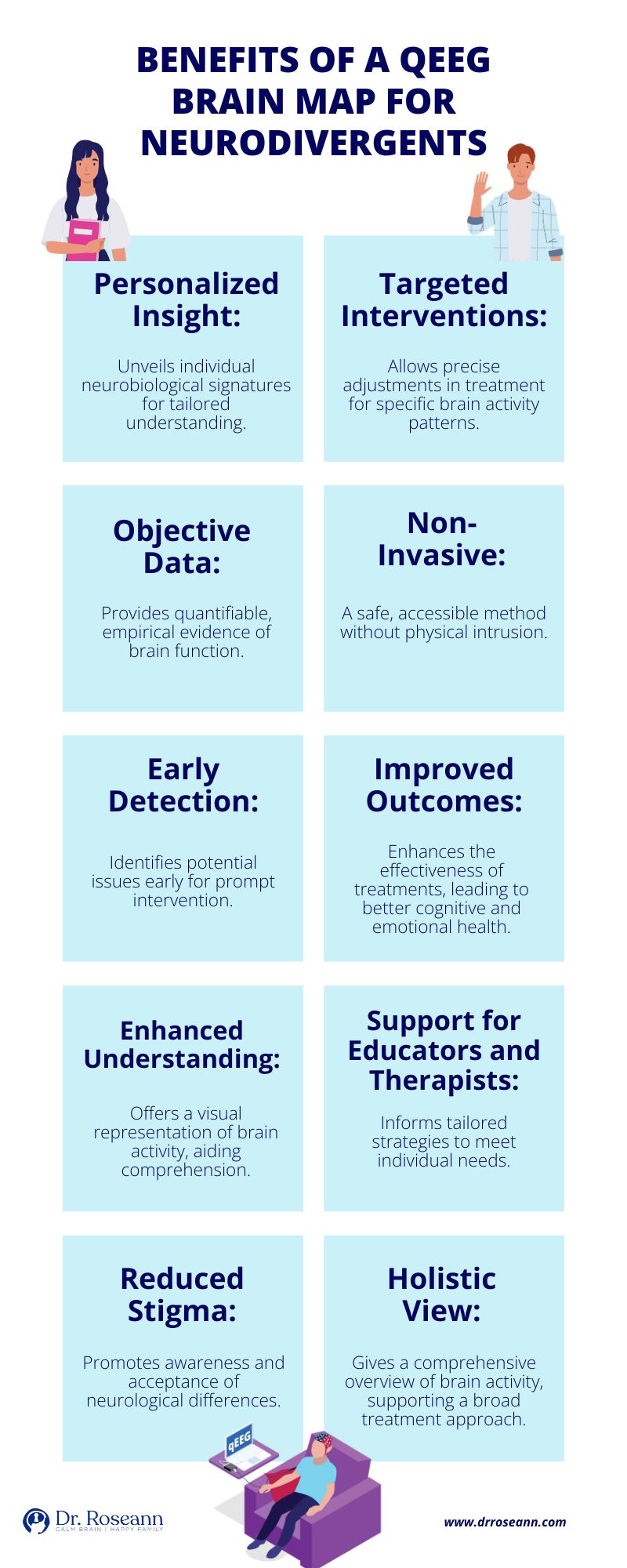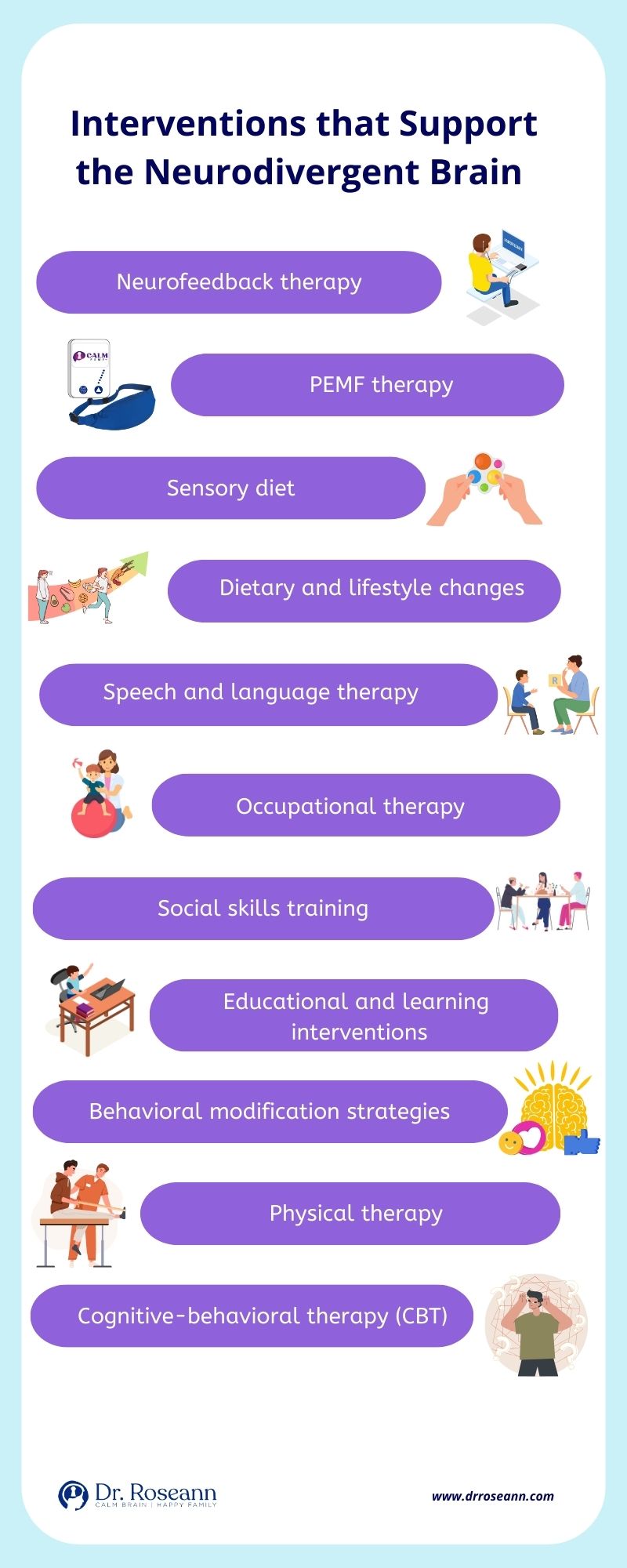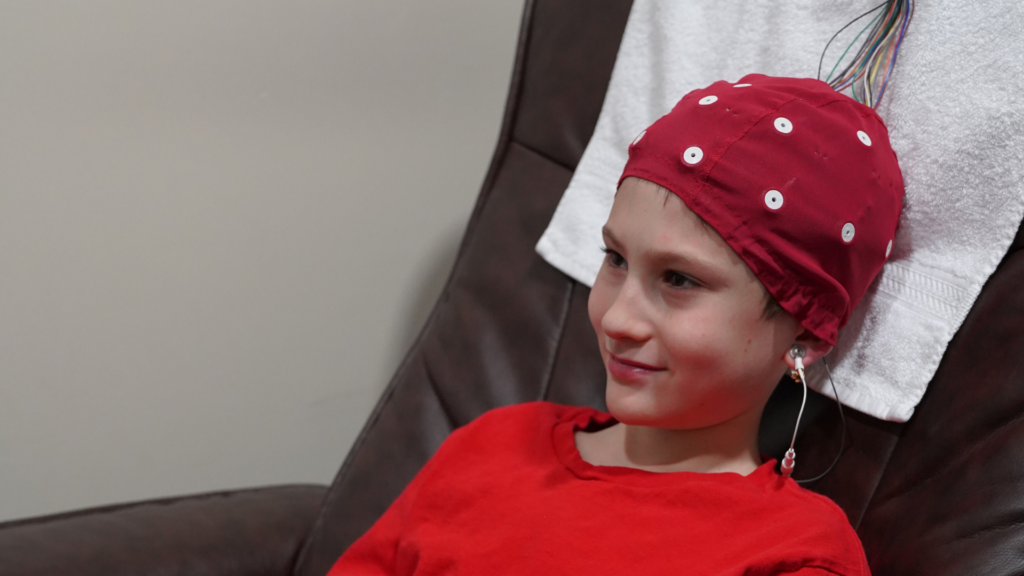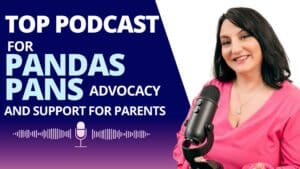Every brain is unique and operates in its distinct way. That’s how you define neurodivergence. As a practicing brain and mental health specialist for over 30 years, I am deeply fascinated by the complexities of the human brain and how its diverse patterns shape our behaviors, thoughts, and emotions.
Being the expert, let me guide you into the world of neurodivergence and explore how Quantitative Electroencephalogram (QEEG) testing can provide valuable insights into understanding and embracing these differences. Every parent should know what a neurodivergent brain test is.
The Role of the QEEG Neurodiversity Test
So, what is neurodiversity? Experts define neurodivergence as a spectrum of neurological variations, including brain profiles such as autism, ADHD, dyslexia, and more. But rather than viewing these differences as deficits, neurodiversity advocates emphasize the strengths and unique perspectives that neurodivergent individuals bring to the table. Understanding and supporting neurodiversity is essential for creating inclusive environments where everyone can thrive.
QEEG testing is a powerful tool used to assess brain activity by measuring electrical patterns along the scalp. Unlike traditional EEGs, which primarily provide qualitative data, QEEG analysis involves sophisticated algorithms to quantify brainwave activity, offering detailed insights into brain function (Nuwer, 1997).
How Does QEEG Relate to Neurodivergence?
A neurodivergent person often exhibits distinctive brainwave patterns compared to neurotypical individuals. A QEEG brain map allows us to identify and characterize these unique patterns to shed light on the underlying neurobiology of various conditions.
Analyzing the frequency, amplitude, and coherence of brainwaves across different brain regions allows us to pinpoint areas of overactivity, underactivity, or dysregulation, which are all important in a neurodivergency test.
For instance, children with ADHD may show increased theta activity in the frontal regions of the brain, which are associated with difficulties in attention and impulse control. Meanwhile, those on the autism spectrum might display altered patterns of connectivity, particularly in areas related to social cognition and sensory processing.
Knowing about these neurobiological signatures gives way to tailored interventions and support strategies to better meet the needs of neurodivergent individuals. Using the QEEG neurodivergent testing can greatly help with this.

Benefits of QEEG in a Neurodiversity Brain Test
The beauty of QEEG testing lies in its ability to uncover individualized neurobiological signatures. It guides clinicians toward tailored interventions that address the unique needs of each neurodivergent individual.
Armed with precise data on brainwave patterns and connectivity, clinicians can devise interventions that target areas that aren’t working at optimal levels, whether over or under stimulated, with unprecedented precision.
Objective Assessment
QEEG testing offers a non-invasive and efficient means of assessing brain function and provides clinicians with valuable insights into the neurophysiological basis of neurodivergent conditions. This neurodivergent brain test enhances the reliability and validity of diagnostic evaluations.
Personalized Interventions
Identifying specific neurobiological markers allows clinicians to tailor interventions that target areas of dysfunction effectively. As QEEG testing enables clinicians to track changes in brain function over time, it’s easier to make dynamic adjustments to intervention strategies based on real-time neurofeedback (Gunet Eroglu et al., 2022).
This personalized approach promotes greater engagement and motivation in individuals undergoing treatment and fosters a sense of empowerment and ownership over their cognitive health journey.

Monitoring Progress
QEEG assessments enable ongoing monitoring of treatment progress, which helps refine strategies over time and track improvements in brain function. Moreover, QEEG assessments provide a quantitative means of tracking treatment progress.
It offers objective measures of brain function that complement subjective reports and behavioral observations. This comprehensive approach allows clinicians to fine-tune interventions, optimize treatment protocols, and celebrate milestones in the individual's neurodevelopmental journey.
How to Tell if You're Neurodivergent
QEEG findings deepen our understanding of neurodiversity as it helps challenge stigma and promote acceptance and inclusion. Neurodivergence brain tests serve as a valuable tool in embracing neurodiversity as they offer insights into the unique brain patterns of neurodivergents.
Leveraging this technology alongside a holistic understanding of neurobiology fosters environments that honor and support the diverse ways in which our brains perceive and interact with the world.
Remember, neurodiversity is not a deviation from the norm but rather a vital aspect of human variation. Through continued research, advocacy, and compassionate care, we can build a more inclusive society where every individual, regardless of neurology, has the opportunity to thrive in neurodiversity.
Want To Know If a QEEG is Right For You?
If you want to learn more about a QEEG Brain Map, Go to www.drroseann.com/help and take our solution matcher to see what type of support is best for you right now. This solution matcher will guide you to the right solution for where you are at. We have many science-backed solutions available and you will also get valuable email resources sent to you.
Am I neurotypical or neurodivergent?
Determining whether you're neurodivergent vs neurotypical typically involves a comprehensive neurodivergent assessment by a qualified professional. Being neurodivergent means your neurological development and functioning differ from what is considered typical, you’ll benefit from undergoing neurodivergent tests like the Am I Neurodivergent Quiz.
What is a neurotypical person like?
A neurotypical person typically demonstrates consistent social skills, attention regulation, and language proficiency. When you compare neurotypical vs. neurodivergent adults and kids, you’ll see individuals in stark contrast and variations in these areas. The basic divergence test can help distinguish between neurotypical and neurodivergent traits.
What does it mean to be neurodivergent?
Being neurodiverse means having a brain that functions, learns, and processes information differently from the neurotypical population. Embracing neurodivergence fosters acceptance and understanding of the unique strengths and challenges individuals may experience.
What is a neurodivergent brain?
Experts define neurodivergent brains as those that operate outside the typical norms of neurological functioning. Assessing neurodivergence often involves a comprehensive evaluation by professionals trained to recognize and understand the complexities of these neurological differences through a neurodivergence test.
What's a neurodivergent screening?
A neurodivergent screening involves assessing for signs you are neurodivergent. These screenings aim to identify potential neurodivergence and may prompt further evaluation by professionals trained to diagnose conditions like autism, ADHD, dyslexia, and others.
What are neurodivergent signs in kids?
The signs of neurodivergence in adults and kids may include atypical social behaviors, difficulty with transitions or sensory processing, and unconventional learning styles. These signs can diverge significantly from neurotypical expectations and may tag your child as neurospicy. Unlike a neurotypical test, which measures typical developmental milestones, identifying neurodivergent symptoms in adults and kids requires considering a broader range of neurodivergent behaviors and characteristics.
What are neurodivergent traits?
Neurodivergent traits in adults and kids include a range of characteristics associated with conditions such as autism, ADHD, and dyslexia, including difficulties with social communication, attention, and sensory processing. In contrast, neurotypical traits typically include strong social skills, consistent attention, and proficiency in language and literacy tasks.
Does ADHD make you neurodivergent?
Yes, ADHD can contribute to neurodivergent traits, including hyperfocusing ADHD. Clinicians define neurodivergent ADHD as variations in attention regulation, impulse control, and sometimes hyperactivity, which differ from neurotypical patterns of functioning.
Are people with anxiety neurodivergent?
While anxiety is a common mental health condition, it doesn't inherently categorize individuals as being neurodivergent. Neurodivergent thinking encompasses variations in cognitive processing. Anxiety, though impactful on mental health, does not fall under the neurodiversity umbrella unless it co-occurs with other conditions that are neurodivergent in nature.
How do you know if you're neurodivergent?
Determining if you're neurodivergent involves recognizing symptoms of neurodivergence, which can vary widely depending on the condition. Taking a neurodivergent test for adults, teens, or kids can help identify potential traits associated with certain conditions. However, it's essential to consult with a qualified professional when doing a neurodiversity test.
What is considered neurodivergent?
Neurodivergence covers a range of conditions characterized by differences in cognitive processing and behavior. Tests for neurodivergence, such as the neurodivergent spectrum test, help identify individuals who exhibit traits outside the neurotypical range, distinguishing them from those who are nondivergent.
Is depression considered neurodivergent?
People with depression are not typically considered neurodivergent types, as it does not inherently involve differences in cognitive processing. However, individuals with neurodivergent conditions such as autism or ADHD may experience comorbid depression, known as neurodivergent depression, which can present unique challenges due to mood symptoms and traits that are not neurotypical.
Does neurodivergent mean autistic?
No, having neurodivergent symptoms does not solely mean being autistic. Neurodivergence awareness emphasizes the recognition of various conditions and traits that diverge from the neurotypical norm. The divergent mind encompasses a spectrum of cognitive differences, reflecting the richness of neurodiversity.
Is bipolar disorder neurodivergent?
Yes, bipolar disorder is considered neurodivergent, as it involves significant variations in mood, energy levels, and behavior that diverge from typical patterns of functioning. Signs of neurodivergent bipolar may include episodes of mania, hypomania, and depression, along with fluctuations in mood and activity levels. While there isn't a specific test for neurodivergence for bipolar neurodivergent people, comprehensive assessments by mental health professionals can help diagnose and address the condition effectively.
Citations
Gunet Eroglu, Mertali Köprülü, & Berdan Karabacak. (2022). Dyslexia biomarker detection with QEEG data in children: Feasibility, Acceptability, Economic impact, Pilot Study and Survey Results. https://doi.org/10.32388/4w9rxu.8
Nuwer, M. (1997). Assessment of digital EEG, quantitative EEG, and EEG brain mapping: Report of the. Neurology, 49, 277–292. https://citeseerx.ist.psu.edu/document?repid=rep1&type=pdf&doi=7d0e429b1d011ff77b35daa6a39d6ead7baba916
Dr. Roseann is a mental health expert in Neurodivergence who frequently is in the media:
- The Holistic Counseling Podcast Therapist's Integrative Tools: Neurofeedback and Biofeedback
- Life's Essential Ingredients Connecting at the Root
- Helping Children Thrive Podcast Benefits of Neurofeedback for children with ADHD
Always remember… “Calm Brain, Happy Family™”
Disclaimer: This article is not intended to give health advice and it is recommended to consult with a physician before beginning any new wellness regime. *The effectiveness of diagnosis and treatment vary by patient and condition. Dr. Roseann Capanna-Hodge, LLC does not guarantee certain results.
Are you looking for SOLUTIONS for your struggling child or teen?
Dr. Roseann and her team are all about science-backed solutions, so you are in the right place!
Grab your complimentary copy of
147 Therapist-Endorsed Self-Regulation Strategies for Children: A Practical Guide for Parents
Dr. Roseann is a Children’s Mental Health Expert and Licensed Therapist who has been featured in/on hundreds of media outlets including The Mel Robbins Show, CBS, NBC, PIX11 NYC, Today, FORBES, CNN, The New York Times, The Washington Post, Business Insider, Women’s Day, Healthline, CNET, Parade Magazine and PARENTS. FORBES called her, “A thought leader in children’s mental health.”

She coined the terms, “Re-entry panic syndrome” and “eco-anxiety” and is a frequent contributor to media on mental health.
Dr. Roseann Capanna-Hodge has three decades of experience in working with children, teens and their families with attention-deficit hyperactivity disorder (ADHD), autism, concussion, dyslexia and learning disability, anxiety, Obsessive Compulsive Disorder (OCD), depression and mood disorder, Lyme Disease, and PANS/PANDAS using science-backed natural mental health solutions such as supplements, magnesium, nutrition, QEEG Brain maps, neurofeedback, PEMF, psychotherapy and other non-medication approaches.
She is the author of three bestselling books, It’s Gonna Be OK!: Proven Ways to Improve Your Child's Mental Health, The Teletherapy Toolkit, and Brain Under Attack. Dr. Roseann is known for offering a message of hope through science-endorsed methods that promote a calm brain.
Her trademarked BrainBehaviorResetⓇ Program and It’s Gonna be OK!Ⓡ Podcast has been a cornerstone for thousands of parents facing mental health, behavioral or neurodevelopmental challenges.
She is the founder and director of The Global Institute of Children’s Mental Health, Neurotastic™Brain Formulas and Dr. Roseann Capanna-Hodge, LLC. Dr. Roseann is a Board Certified Neurofeedback (BCN) Practitioner, a Board Member of the Northeast Region Biofeedback Society (NRBS), Certified Integrative Mental Health Professional (CIMHP) and an Amen Clinic Certified Brain Health Coach. She is also a member of The International Lyme Disease and Associated Disease Society (ILADS), The American Psychological Association (APA), Anxiety and Depression Association of America (ADAA) National Association of School Psychologists (NASP), International OCD Foundation (IOCDF).
© Roseann-Capanna-Hodge, LLC 2024










